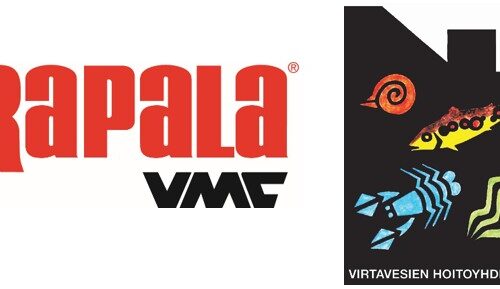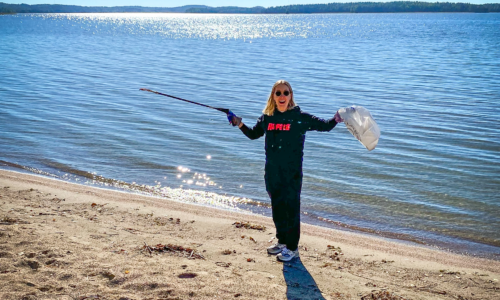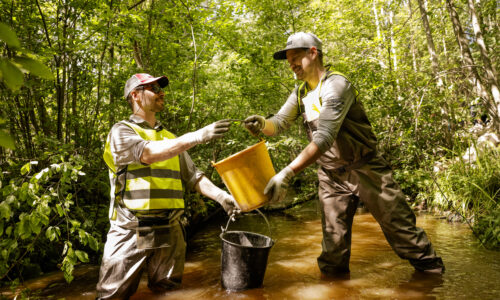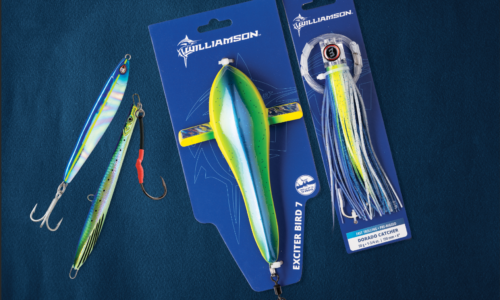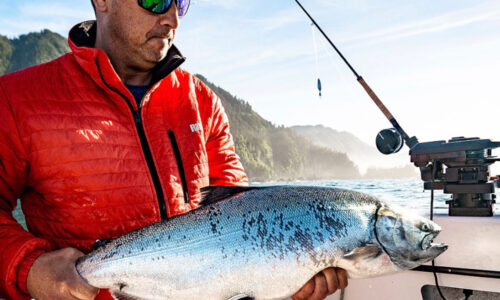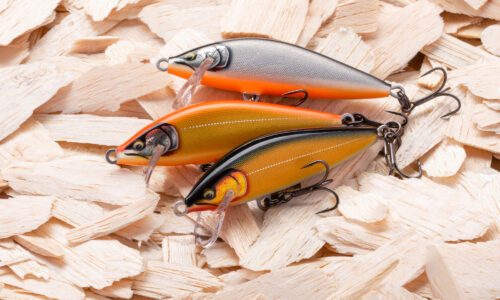Sustainability in action
Explore our initiatives and success stories
Strategy of continuous improvement
Explore our strategic themes and targets to learn how we are making a positive impact
Consistently sustainable products & packages

Consistently sustainable products & packages
Our products are linked to experiences in nature and the outdoors. This underscores the indispensability of a healthy environment to our business.
Most of the Group’s products are long-lasting, kept and used by consumers for years or even decades. Yet, we are aware of the possible negative impacts that our business can have on the environment or fish, both due to the use of our products, such as plastics, in the water, but also in connection with the production of our products.
We put an effort in introducing more sustainable lure materials, reducing plastic used for packages – while ensuring the safety of those who handle them, and increasing certified cardboard used in packaging.
Ambitious long-term innovations and PD

Ambitious long-term innovations and PD
At the heart of our product development lie two core principles: quality and durability. We’re committed to crafting high-quality products that stand the test of time. Moreover, we’ve set ambitious goals for long-term innovation and product development, with a specific focus on finding alternatives to substances harmful to aquatic ecosystems.
While some of our products contain small amounts of raw materials that could impact the environment negatively – such as lead in certain metal lures – we’re actively working on introducing alternative solutions. Our target is to eliminate or substitute lead in all Rapala branded products, and adopt biodegradable material for soft baits – yet still maintaining the products’ functionality.
Our efforts are already paying off as we have successfully transitioned over 90% of Rapala hard baits to lead-free construction.
Reducing carbon footprint

Reducing carbon footprint
The primary sources of our direct and indirect emissions include electricity, district heating, and natural gas as well as fossil fuels, that some sites use as a reserve and additional energy.
One of our objectives is to reduce our energy-related emissions by sourcing all our energy from fossil-free sources. We’ve already made progress in cutting our carbon footprint by transitioning to renewable energy and installing solar panels in numerous facilities as well as enhancing overall energy efficiency.
We are further developing the data gathering and calculation of our value chain (Scope 3) emissions and creating a clear road-map for our emission reduction targets
Giving back

Giving back
We’re committed to doing good—reel good. As active members of various associations, we contribute to numerous initiatives within local communities. Each of our units will participate in grassroots projects related to waterway conservation, providing fishing access for groups with special needs, or similar themes.
In Finland our collaboration with Keep the Archipelago Tidy Association and The Association for Stream Restoration – Virho ry align with our commitment to ensuring clean fishing waters for future generations. Our goal is to give back to the societies and environment we operate in.

”Together” – Rapala VMC as highly desired workplace globally
We strive to reinforce Rapala VMC as a highly desired workplace globally. This work starts from within by supporting the health and wellbeing of our people as well as their professional development. With more than 1,300 employees spanning over 40 countries, our global community creates avenues for international career paths. We also have many impressive career growth stories in the organization, whether it’s taking a more “vertical” path or exploring opportunities in different teams. We don’t only value ready-made professionals: we believe in potential and giving responsibility.
If you ask any of our team members, they will most likely tell you that the thing they appreciate the most at Rapala VMC is the community. It is tightly knit but welcoming and we are big believers in helping one another. Whether it’s work, overcoming obstacles, or celebrating victories, we do it together. Cultivating our culture is a project that never gets ready, but some of the recent steps we have taken are reducing management layers and bureaucracy and adding focus on having fun together.
And yes, we do get to fish on company time!

Customer satisfaction
We are the world’s leading fishing tackle company and the global market leader in lures, treble hooks, and fishing-related knives and tools. It is due to our award-winning and enduring products coupled with our passion to craft outstanding experiences for anglers.
Our relentless focus on product development empowers us to create cutting-edge products that instill confidence in demanding anglers worldwide.
While North America stands as our largest and most important market, contributing to half of our sales, we also hold a robust market position in the Nordic countries. Understanding and meeting our customers’ and consumers’ evolving needs locally is the cornerstone of our business.

Sustainability strategy & management
For us, sustainability is a guiding principle that involves upholding the high quality for which our products are renowned while constantly steering our production towards a more sustainable direction. To this end, we launched our new sustainability Strategy of Constant Improvement for the upcoming strategic period from 2024 to 2026.
A primary objective for the upcoming three-year strategic period is the establishment of a robust and well-integrated sustainability management function throughout the Group. The cross-functional team will facilitate the management and harmonization of our ways of working.
The tasks and responsibilities in advancing sustainable conduct for different functions are described in the table.
| Function | Tasks & responsibilities |
|---|---|
| Board of Directors | Sets Rapala VMC Group’s sustainability ambition level, focus areas and targets
Approves (sustainability) strategy prepared by the management Follows up progress against set targets quarterly and reviews the annual sustainability reporting |
| Global Management Team | Prepares and proposes the (sustainability) strategy, focus areas and targets
Owns the sustainability targets and ensures these are linked to the overall strategic targets Approves sustainability related policies and processes Follows up progress against set targets quarterly and reviews the annual sustainability reportin |
| Sustainability Management | Steering sustainability strategic planning, target setting & performance follow-up
Follow-up of regulatory requirements, policies, trends & other expectations Overseeing ESG related data collection & auditing Ensuring relevant policies are in place & up-to-date Steering the sustainability team/champion network Providing internal consulting & support on sustainability topics |
| Sustainability Champions/Team | Cross-functional team driving sustainability initiatives in their respective functions
Ensuring sustainability related reporting quality in their respective functions Entity / Function respective sustainability communication Driving continues sustainability development in their respective functions |
| Sales Areas & Global Functions | Integrating sustainability initiatives & targets into their operations. Creating and cascading sub-targets as part of the annual planning process
Ensuring relevant policies are implemented & relevant people trained in the function Responsible for ESG reporting and data quality |

Our policies
Our day-to-day decisions and ways of working are guided by our Code of Conduct.
The Code of Conduct is complemented by other Group-level policies, such as:
· Human rights policy
· Anti-corruption policy
· Tax policy
· Supplier Code of Conduct
We are in the process of updating both our Code of Conduct and the corresponding internal control materials to reflect our refined sustainability ambitions more accurately.
We believe that a sustainable future is achieved through collective efforts. We aim to cultivate enduring relationships with suppliers who share our vision and are committed to fostering a more sustainable business. Our Supplier Code of Conduct outlines our minimum expectations for all suppliers.

Whistleblowing to raise concerns
We are committed to fostering transparency and upholding a high standard of business ethics. We encourage everyone to freely express dissenting opinions and concerns, urging them to report any potential misconduct on our part.
To confidentially alert us on suspicions of misconduct we maintain an open whistleblowing channel. It serves as an important tool for mitigating risks and allowing us to identify and address potential misconduct at an early stage.

Consistently sustainable products & packages
Our products are linked to experiences in nature and the outdoors. This underscores the indispensability of a healthy environment to our business.
Most of the Group’s products are long-lasting, kept and used by consumers for years or even decades. Yet, we are aware of the possible negative impacts that our business can have on the environment or fish, both due to the use of our products, such as plastics, in the water, but also in connection with the production of our products.
We put an effort in introducing more sustainable lure materials, reducing plastic used for packages – while ensuring the safety of those who handle them, and increasing certified cardboard used in packaging.

Ambitious long-term innovations and PD
At the heart of our product development lie two core principles: quality and durability. We’re committed to crafting high-quality products that stand the test of time. Moreover, we’ve set ambitious goals for long-term innovation and product development, with a specific focus on finding alternatives to substances harmful to aquatic ecosystems.
While some of our products contain small amounts of raw materials that could impact the environment negatively – such as lead in certain metal lures – we’re actively working on introducing alternative solutions. Our target is to eliminate or substitute lead in all Rapala branded products, and adopt biodegradable material for soft baits – yet still maintaining the products’ functionality.
Our efforts are already paying off as we have successfully transitioned over 90% of Rapala hard baits to lead-free construction.

Reducing carbon footprint
The primary sources of our direct and indirect emissions include electricity, district heating, and natural gas as well as fossil fuels, that some sites use as a reserve and additional energy.
One of our objectives is to reduce our energy-related emissions by sourcing all our energy from fossil-free sources. We’ve already made progress in cutting our carbon footprint by transitioning to renewable energy and installing solar panels in numerous facilities as well as enhancing overall energy efficiency.
We are further developing the data gathering and calculation of our value chain (Scope 3) emissions and creating a clear road-map for our emission reduction targets

Giving back
We’re committed to doing good—reel good. As active members of various associations, we contribute to numerous initiatives within local communities. Each of our units will participate in grassroots projects related to waterway conservation, providing fishing access for groups with special needs, or similar themes.
In Finland our collaboration with Keep the Archipelago Tidy Association and The Association for Stream Restoration – Virho ry align with our commitment to ensuring clean fishing waters for future generations. Our goal is to give back to the societies and environment we operate in.
”Together” – Rapala VMC as highly desired workplace globally

”Together” – Rapala VMC as highly desired workplace globally
We strive to reinforce Rapala VMC as a highly desired workplace globally. This work starts from within by supporting the health and wellbeing of our people as well as their professional development. With more than 1,300 employees spanning over 40 countries, our global community creates avenues for international career paths. We also have many impressive career growth stories in the organization, whether it’s taking a more “vertical” path or exploring opportunities in different teams. We don’t only value ready-made professionals: we believe in potential and giving responsibility.
If you ask any of our team members, they will most likely tell you that the thing they appreciate the most at Rapala VMC is the community. It is tightly knit but welcoming and we are big believers in helping one another. Whether it’s work, overcoming obstacles, or celebrating victories, we do it together. Cultivating our culture is a project that never gets ready, but some of the recent steps we have taken are reducing management layers and bureaucracy and adding focus on having fun together.
And yes, we do get to fish on company time!
Customer satisfaction

Customer satisfaction
We are the world’s leading fishing tackle company and the global market leader in lures, treble hooks, and fishing-related knives and tools. It is due to our award-winning and enduring products coupled with our passion to craft outstanding experiences for anglers.
Our relentless focus on product development empowers us to create cutting-edge products that instill confidence in demanding anglers worldwide.
While North America stands as our largest and most important market, contributing to half of our sales, we also hold a robust market position in the Nordic countries. Understanding and meeting our customers’ and consumers’ evolving needs locally is the cornerstone of our business.

Sustainability strategy & management
For us, sustainability is a guiding principle that involves upholding the high quality for which our products are renowned while constantly steering our production towards a more sustainable direction. To this end, we launched our new sustainability Strategy of Constant Improvement for the upcoming strategic period from 2024 to 2026.
A primary objective for the upcoming three-year strategic period is the establishment of a robust and well-integrated sustainability management function throughout the Group. The cross-functional team will facilitate the management and harmonization of our ways of working.
The tasks and responsibilities in advancing sustainable conduct for different functions are described in the table.
| Function | Tasks & responsibilities |
|---|---|
| Board of Directors | Sets Rapala VMC Group’s sustainability ambition level, focus areas and targets
Approves (sustainability) strategy prepared by the management Follows up progress against set targets quarterly and reviews the annual sustainability reporting |
| Global Management Team | Prepares and proposes the (sustainability) strategy, focus areas and targets
Owns the sustainability targets and ensures these are linked to the overall strategic targets Approves sustainability related policies and processes Follows up progress against set targets quarterly and reviews the annual sustainability reportin |
| Sustainability Management | Steering sustainability strategic planning, target setting & performance follow-up
Follow-up of regulatory requirements, policies, trends & other expectations Overseeing ESG related data collection & auditing Ensuring relevant policies are in place & up-to-date Steering the sustainability team/champion network Providing internal consulting & support on sustainability topics |
| Sustainability Champions/Team | Cross-functional team driving sustainability initiatives in their respective functions
Ensuring sustainability related reporting quality in their respective functions Entity / Function respective sustainability communication Driving continues sustainability development in their respective functions |
| Sales Areas & Global Functions | Integrating sustainability initiatives & targets into their operations. Creating and cascading sub-targets as part of the annual planning process
Ensuring relevant policies are implemented & relevant people trained in the function Responsible for ESG reporting and data quality |

Our policies
Our day-to-day decisions and ways of working are guided by our Code of Conduct.
The Code of Conduct is complemented by other Group-level policies, such as:
· Human rights policy
· Anti-corruption policy
· Tax policy
· Supplier Code of Conduct
We are in the process of updating both our Code of Conduct and the corresponding internal control materials to reflect our refined sustainability ambitions more accurately.
We believe that a sustainable future is achieved through collective efforts. We aim to cultivate enduring relationships with suppliers who share our vision and are committed to fostering a more sustainable business. Our Supplier Code of Conduct outlines our minimum expectations for all suppliers.

Whistleblowing to raise concerns
We are committed to fostering transparency and upholding a high standard of business ethics. We encourage everyone to freely express dissenting opinions and concerns, urging them to report any potential misconduct on our part.
To confidentially alert us on suspicions of misconduct we maintain an open whistleblowing channel. It serves as an important tool for mitigating risks and allowing us to identify and address potential misconduct at an early stage.

Consistently sustainable products & packages
Our products are linked to experiences in nature and the outdoors. This underscores the indispensability of a healthy environment to our business.
Most of the Group’s products are long-lasting, kept and used by consumers for years or even decades. Yet, we are aware of the possible negative impacts that our business can have on the environment or fish, both due to the use of our products, such as plastics, in the water, but also in connection with the production of our products.
We put an effort in introducing more sustainable lure materials, reducing plastic used for packages – while ensuring the safety of those who handle them, and increasing certified cardboard used in packaging.

Ambitious long-term innovations and PD
At the heart of our product development lie two core principles: quality and durability. We’re committed to crafting high-quality products that stand the test of time. Moreover, we’ve set ambitious goals for long-term innovation and product development, with a specific focus on finding alternatives to substances harmful to aquatic ecosystems.
While some of our products contain small amounts of raw materials that could impact the environment negatively – such as lead in certain metal lures – we’re actively working on introducing alternative solutions. Our target is to eliminate or substitute lead in all Rapala branded products, and adopt biodegradable material for soft baits – yet still maintaining the products’ functionality.
Our efforts are already paying off as we have successfully transitioned over 90% of Rapala hard baits to lead-free construction.

Reducing carbon footprint
The primary sources of our direct and indirect emissions include electricity, district heating, and natural gas as well as fossil fuels, that some sites use as a reserve and additional energy.
One of our objectives is to reduce our energy-related emissions by sourcing all our energy from fossil-free sources. We’ve already made progress in cutting our carbon footprint by transitioning to renewable energy and installing solar panels in numerous facilities as well as enhancing overall energy efficiency.
We are further developing the data gathering and calculation of our value chain (Scope 3) emissions and creating a clear road-map for our emission reduction targets

Giving back
We’re committed to doing good—reel good. As active members of various associations, we contribute to numerous initiatives within local communities. Each of our units will participate in grassroots projects related to waterway conservation, providing fishing access for groups with special needs, or similar themes.
In Finland our collaboration with Keep the Archipelago Tidy Association and The Association for Stream Restoration – Virho ry align with our commitment to ensuring clean fishing waters for future generations. Our goal is to give back to the societies and environment we operate in.

”Together” – Rapala VMC as highly desired workplace globally
We strive to reinforce Rapala VMC as a highly desired workplace globally. This work starts from within by supporting the health and wellbeing of our people as well as their professional development. With more than 1,300 employees spanning over 40 countries, our global community creates avenues for international career paths. We also have many impressive career growth stories in the organization, whether it’s taking a more “vertical” path or exploring opportunities in different teams. We don’t only value ready-made professionals: we believe in potential and giving responsibility.
If you ask any of our team members, they will most likely tell you that the thing they appreciate the most at Rapala VMC is the community. It is tightly knit but welcoming and we are big believers in helping one another. Whether it’s work, overcoming obstacles, or celebrating victories, we do it together. Cultivating our culture is a project that never gets ready, but some of the recent steps we have taken are reducing management layers and bureaucracy and adding focus on having fun together.
And yes, we do get to fish on company time!

Customer satisfaction
We are the world’s leading fishing tackle company and the global market leader in lures, treble hooks, and fishing-related knives and tools. It is due to our award-winning and enduring products coupled with our passion to craft outstanding experiences for anglers.
Our relentless focus on product development empowers us to create cutting-edge products that instill confidence in demanding anglers worldwide.
While North America stands as our largest and most important market, contributing to half of our sales, we also hold a robust market position in the Nordic countries. Understanding and meeting our customers’ and consumers’ evolving needs locally is the cornerstone of our business.
Sustainability strategy & management

Sustainability strategy & management
For us, sustainability is a guiding principle that involves upholding the high quality for which our products are renowned while constantly steering our production towards a more sustainable direction. To this end, we launched our new sustainability Strategy of Constant Improvement for the upcoming strategic period from 2024 to 2026.
A primary objective for the upcoming three-year strategic period is the establishment of a robust and well-integrated sustainability management function throughout the Group. The cross-functional team will facilitate the management and harmonization of our ways of working.
The tasks and responsibilities in advancing sustainable conduct for different functions are described in the table.
| Function | Tasks & responsibilities |
|---|---|
| Board of Directors | Sets Rapala VMC Group’s sustainability ambition level, focus areas and targets
Approves (sustainability) strategy prepared by the management Follows up progress against set targets quarterly and reviews the annual sustainability reporting |
| Global Management Team | Prepares and proposes the (sustainability) strategy, focus areas and targets
Owns the sustainability targets and ensures these are linked to the overall strategic targets Approves sustainability related policies and processes Follows up progress against set targets quarterly and reviews the annual sustainability reportin |
| Sustainability Management | Steering sustainability strategic planning, target setting & performance follow-up
Follow-up of regulatory requirements, policies, trends & other expectations Overseeing ESG related data collection & auditing Ensuring relevant policies are in place & up-to-date Steering the sustainability team/champion network Providing internal consulting & support on sustainability topics |
| Sustainability Champions/Team | Cross-functional team driving sustainability initiatives in their respective functions
Ensuring sustainability related reporting quality in their respective functions Entity / Function respective sustainability communication Driving continues sustainability development in their respective functions |
| Sales Areas & Global Functions | Integrating sustainability initiatives & targets into their operations. Creating and cascading sub-targets as part of the annual planning process
Ensuring relevant policies are implemented & relevant people trained in the function Responsible for ESG reporting and data quality |
Our policies

Our policies
Our day-to-day decisions and ways of working are guided by our Code of Conduct.
The Code of Conduct is complemented by other Group-level policies, such as:
· Human rights policy
· Anti-corruption policy
· Tax policy
· Supplier Code of Conduct
We are in the process of updating both our Code of Conduct and the corresponding internal control materials to reflect our refined sustainability ambitions more accurately.
We believe that a sustainable future is achieved through collective efforts. We aim to cultivate enduring relationships with suppliers who share our vision and are committed to fostering a more sustainable business. Our Supplier Code of Conduct outlines our minimum expectations for all suppliers.
Whistle blowing to raise concerns

Whistleblowing to raise concerns
We are committed to fostering transparency and upholding a high standard of business ethics. We encourage everyone to freely express dissenting opinions and concerns, urging them to report any potential misconduct on our part.
To confidentially alert us on suspicions of misconduct we maintain an open whistleblowing channel. It serves as an important tool for mitigating risks and allowing us to identify and address potential misconduct at an early stage.
Want to learn more?
Find more details about sustainability, corporate responsibility, and our special initiatives in our sustainability report
Sustainability goals by brand
Learn how our brands are setting sustainability targets and taking steps to reduce their environmental impact
Lead-free
FSC certified wood
Bio-Based & Recycled Components
Recycled & Recyclable Packaging

Sustainability for Rapala lures
Lead-Free
If incorrectly discarded, lead can be harmful to the environment and living organisms. Rapala is actively replacing lead weight used in lures with more ecological materials. We have already removed lead from over 95% of our lures.
FSC-Certified Wood:
Many Rapala lures are made with balsa. To minimize the environmental impact and ensure responsible production and sourcing, we use FSC-certified balsa when available. The certificate is a guarantee that the forests used are being managed in a way that preserves biological diversity and benefits the lives of local people and workers.
Bio-Based & Recycled Components:
Alongside wood, Rapala uses other bio-based components – such as diving lips made from bio-based plastic. Many Rapala’s plastic-bodied hard baits use plastic inserts made 100 % from recycled plastics.
Recycled & Recyclable Packaging:
Since lures come with needle-sharp hooks, the products must come in a package. Rapala is constantly striving to make the packaging more sustainable. A large portion of the packaging consists of recyclable cardboard – and when we use plastic, we use recycled plastic.
Plastic-Free Packaging – or no Packaging at all
Vegetable Tanned Sheaths
Wooden or Bio-Composite Handles

Sustainability for Marttiini
Plastic-Free Packaging – or no Packaging at all:
Marttiini is constantly looking into ways of making the packaging more sustainable. The most sustainable packaging is to have no packaging at all. Many Marttiini products are already sold without packaging. But, when packaging is required, Marttiini is constantly striving to reduce the amount of plastic in it. Many of Marttiini’s packaging are already plastic-free.
Vegetable Tanned Sheaths:
Marttiini’s leather sheaths are either chrome tanned or vegetable tanned to extend the sheaths’ life cycle. Vegetable tanning is done with components found in nature, making the process more environmentally friendly – especially when considering the waste management of the processing materials. Many of Marttiini’s leather sheaths are vegetable tanned.
Wooden or Bio-Composite Handles:
Marttiini’s knives have handles made of either plastic, rubber, or wood. As a material, wood is the most ecological – and it’s the most-used material in Marttiini’s handles. Marttiini always uses Finnish wood, reducing the emissions resulting from shipping. And, to give back to nature, Marttiini is planting forests with Reforest to compensate for carbon emissions.
Feed Hygiene Compliant
Recyclable Packaging
Minimized Packaging

Sustainability for Dynamite Bait’s
Feed Hygiene Compliant:
Dynamite Bait’s products are made from certified ingredients from responsible sources, meaning that their origin is easily traceable and they meet the high quality standards set for animal feed.
Recyclable Packaging:
Dynamite Baits’ products are animal feed, and they have to be packaged carefully. By using plastic, we ensure the products have years of shelf life. To reduce the environmental impact, the plastic we use is recyclable to make sure it can be reused.
Minimized Packaging:
While respecting the highest standards in packaging, we have minimized the amount of material used in packaging. Our target for the packaging is that it consist less than 20 % of the product’s gross weight.
Contact us
Further questions regarding Rapala VMC’s sustainability strategy ? Reach out to Rapala VMC’s sustainability team
